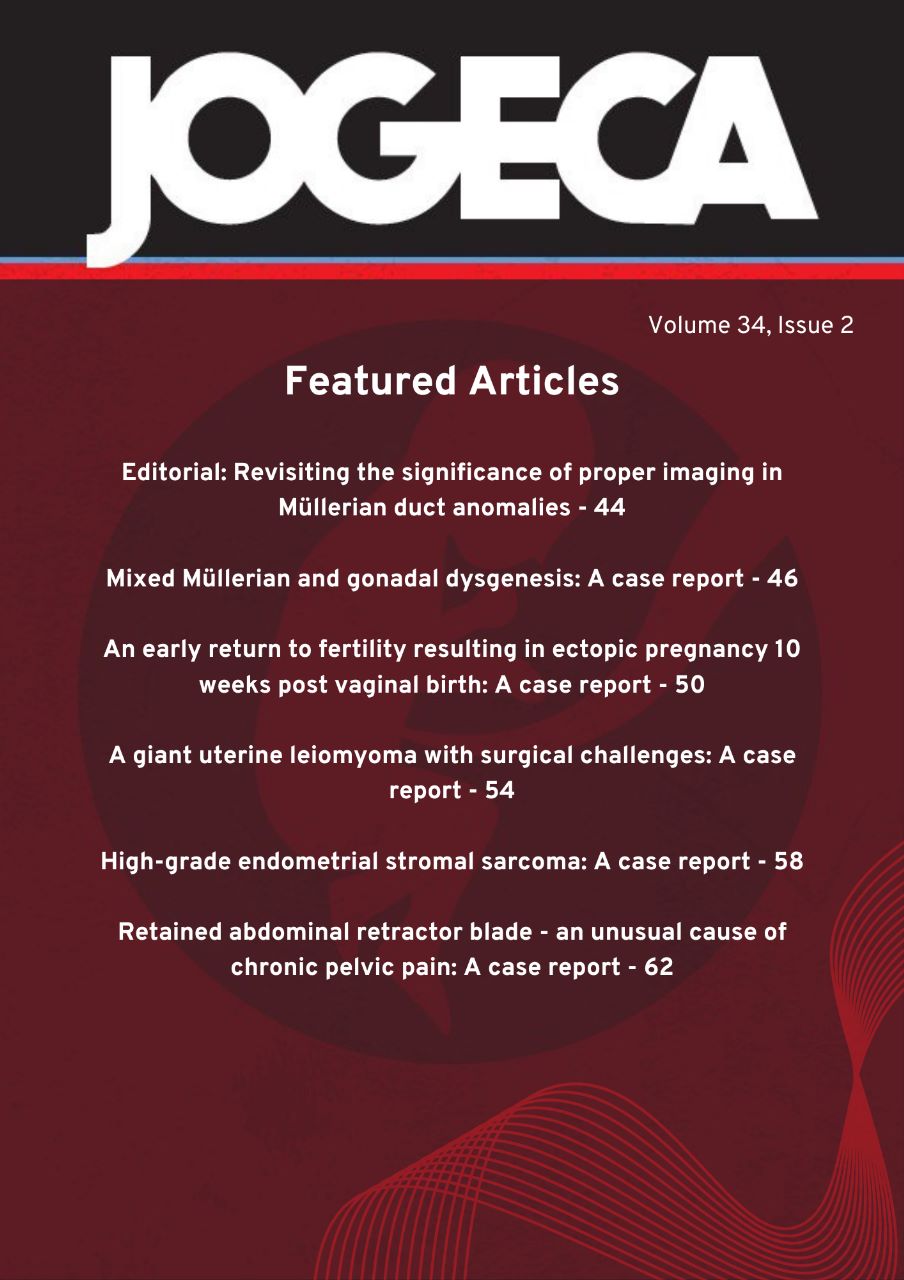Phyllodes tumor, cardiovascular and chronic renal disease in a young lady on hormone replacement therapy: A case report
DOI:
https://doi.org/10.59692/jogeca.v37i2.270Keywords:
Phyllodes tumor, Breast Cancer, Hormonal Replacement Therapy, Dysgerminoma, Li Fraumeni syndromeAbstract
Background: Hormonal replacement therapy (HRT) has been associated with an
increased risk of developing breast cancer. The level of risk varies with different types of
HRT and the duration of use. Phyllodes tumor accounts for less than 1% of all breast
neoplasms and is associated with Li-Fraumeni syndrome.
Case presentation: A 37-year-old nulliparous woman presented with a left breast lump.
Histological examination revealed a spindle cell neoplasm consistent with a malignant
phyllodes tumor. She was diagnosed at age of 12 with ovarian dysgerminoma, had
subtotal hysterectomy and right oophorectomy, radiotherapy and chemotherapy. She
has been on HRT with conjugated equine estrogens for 13 years and tibolone for the
last 5 years. Following the diagnosis of phyllodes tumor, a mastectomy was performed,
and HRT was changed to vaginal estrogen gel.
Conclusion: Hormonal replacement therapy may pose a risk for certain types of breast
cancer, especially with prolonged use of combined therapy. Patients who develop
cancers early in life, as well as those on HRT, require close follow-up and adequate
patient education with an emphasis on self-breast examination. Sensitization of
healthcare providers and patients on the value of genetic screening would facilitate
early identification of such patients and follow-up at high-risk clinics.
References
Collaborative Group on Hormonal Factors in Breast Cancer. Type and timing of
menopausal hormone therapy and breast cancer risk: individual participant meta-
analysis of the worldwide epidemiological evidence. Lancet. 2019;394(10204):1159-
doi:10.1016/S0140-6736(19)31709-X DOI: https://doi.org/10.1016/S0140-6736(19)31709-X
Chlebowski RT, Anderson GL, Aragaki AK, et al. Association of Menopausal
Hormone Therapy With Breast Cancer Incidence and Mortality During Long-term
Follow-up of the Women's Health Initiative Randomized Clinical Trials. JAMA.
;324(4):369-380. doi:10.1001/jama.2020.9482 DOI: https://doi.org/10.1001/jama.2020.9482
Vinogradova Y, Coupland C, Hippisley-Cox J. Use of hormone replacement
therapy and risk of breast cancer: nested case-control studies using the QResearch and
CPRD databases. BMJ. 2020;371:m3873. Published 2020 Oct 28.
doi:10.1136/bmj.m3873 DOI: https://doi.org/10.1136/bmj.m3873
Zhang Y, Kleer CG. Phyllodes Tumor of the Breast: Histopathologic Features,
Differential Diagnosis, and Molecular/Genetic Updates. Arch Pathol Lab Med.
;140(7):665-671. doi:10.5858/arpa.2016-0042-RA DOI: https://doi.org/10.5858/arpa.2016-0042-RA
Sapino A, Bosco M, Cassoni P, et al. Estrogen receptor-beta is expressed in
stromal cells of fibroadenoma and phyllodes tumors of the breast. Mod Pathol.
;19(4):599-606. doi:10.1038/modpathol.3800574 DOI: https://doi.org/10.1038/modpathol.3800574
Limaiem F, Kashyap S. Phyllodes Tumor of the Breast. In: StatPearls. Treasure
Island (FL): StatPearls Publishing; January 1, 2023
Mustață L, Gică N, Botezatu R, et al. Malignant Phyllodes Tumor of the Breast
and Pregnancy: A Rare Case Report and Literature Review. Medicina (Kaunas).
;58(1):36. Published 2021 Dec 26. doi:10.3390/medicina58010036 DOI: https://doi.org/10.3390/medicina58010036
Giacomazzi J, Koehler-Santos P, Palmero EI, et al. A TP53 founder mutation,
p.R337H, is associated with phyllodes breast tumors in Brazil. Virchows Arch.
;463(1):17-22. doi:10.1007/s00428-013-1439-8 DOI: https://doi.org/10.1007/s00428-013-1439-8
Chen SN, Lombardi R, Karmouch J, et al. DNA Damage Response/TP53
Pathway Is Activated and Contributes to the Pathogenesis of Dilated Cardiomyopathy
Associated With LMNA (Lamin A/C) Mutations. Circ Res. 2019;124(6):856-873.
doi:10.1161/CIRCRESAHA.118.314238 DOI: https://doi.org/10.1161/CIRCRESAHA.118.314238
Bartoli C, Zurrida SM, Clemente C. Phyllodes tumor in a male patient with
bilateral gynaecomastia induced by oestrogen therapy for prostatic carcinoma. Eur J
Surg Oncol. 1991;17(2):215-217 DOI: https://doi.org/10.3109/01902149109064412
Downloads
Published
How to Cite
Issue
Section
Categories
License
Copyright (c) 2025 The authors.

This work is licensed under a Creative Commons Attribution 4.0 International License.





